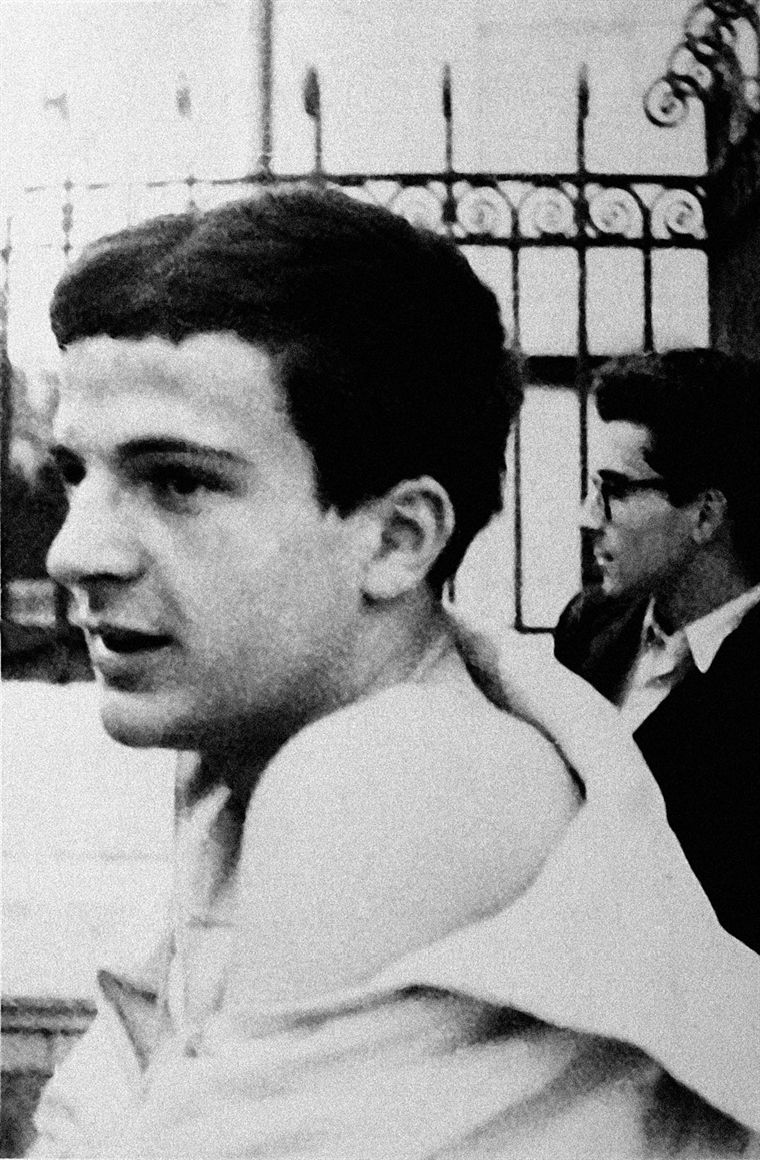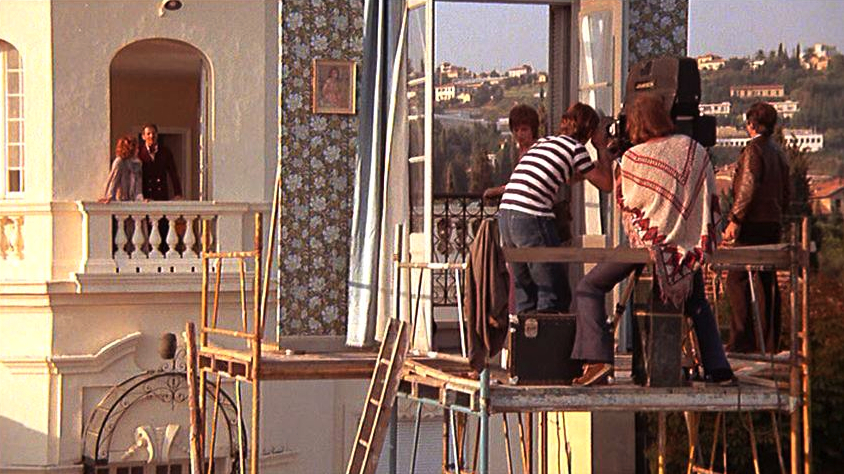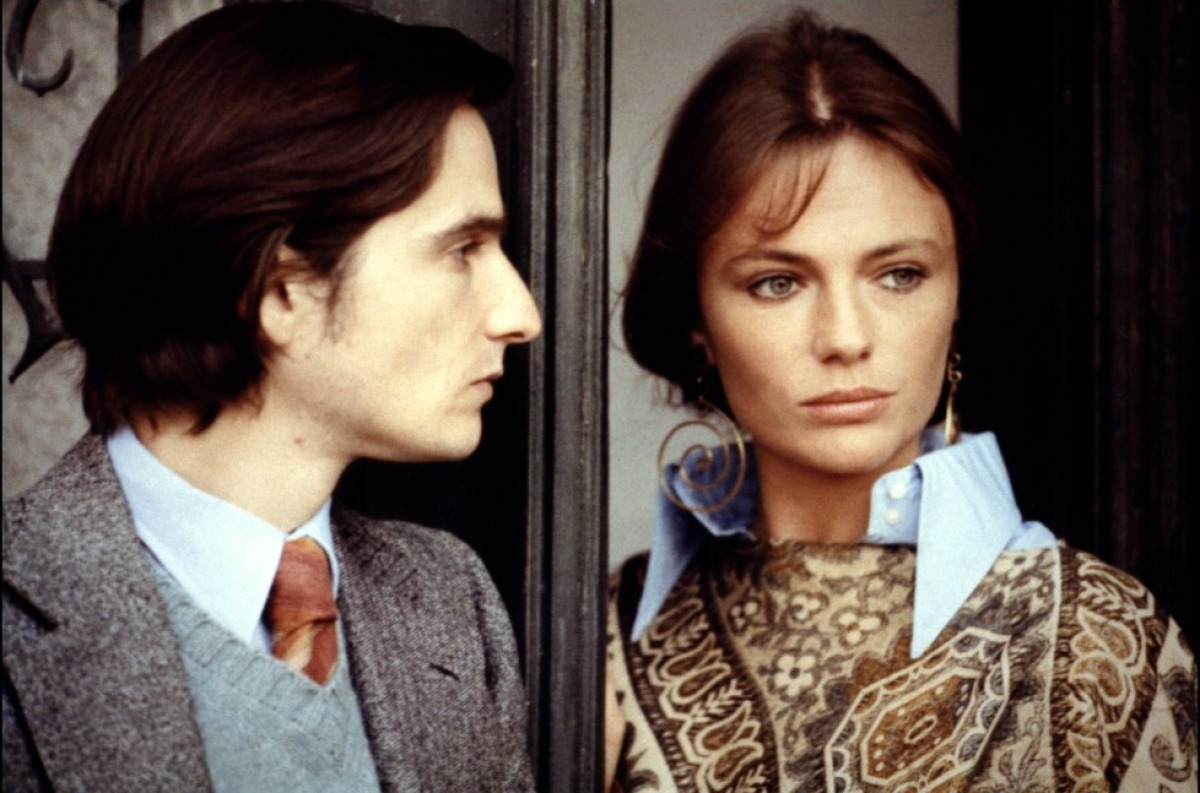1973 Look Back: The End of the New Wave, the Beginning of My Cinephilia
 Sunday, July 27, 2014 at 1:00PM
Sunday, July 27, 2014 at 1:00PM The team is looking back at 1973 as we approach the Smackdown. Here's Amir with a personal history...
 the first known photo of this famous cineaste pair. Before they were filmmakers. [src]Jean-Luc Godard and François Truffaut were the poster boys of the French New Wave, its most recognizable faces. Their friendship that had begun in the 1940s had carried them through all their years at Cahiers and into their directing careers, and their admiration for each other was evidenced by Godard’s reaction to Truffaut’s The 400 Blows and the latter’s providing the story for his friend’s first film, Breathless. Their early writings manifest the division they had from the beginning about their outlook on the mechanics and politics of cinema. Nonetheless, their friendship continued even through the fraught days of political disagreement in 1968; but no further than 1973. Truffaut’s Day for Night (La Nuit Americaine) was an unforgivable crime in Godard’s eyes, and the latter’s disapproval of the film was a massive act of hypocrisy in Truffaut’s. They were to never see each other again, and only after Truffaut’s death did Godard find nice words to say about his old friend.
the first known photo of this famous cineaste pair. Before they were filmmakers. [src]Jean-Luc Godard and François Truffaut were the poster boys of the French New Wave, its most recognizable faces. Their friendship that had begun in the 1940s had carried them through all their years at Cahiers and into their directing careers, and their admiration for each other was evidenced by Godard’s reaction to Truffaut’s The 400 Blows and the latter’s providing the story for his friend’s first film, Breathless. Their early writings manifest the division they had from the beginning about their outlook on the mechanics and politics of cinema. Nonetheless, their friendship continued even through the fraught days of political disagreement in 1968; but no further than 1973. Truffaut’s Day for Night (La Nuit Americaine) was an unforgivable crime in Godard’s eyes, and the latter’s disapproval of the film was a massive act of hypocrisy in Truffaut’s. They were to never see each other again, and only after Truffaut’s death did Godard find nice words to say about his old friend.
It’s easy to see why Day for Night made Godard’s blood boil. It’s as conventionally constructed a film as one can expect from a nouevelle vague filmmaker, an unashamed love letter to Hollywood and cinema itself – and with an Oscar in its cap, no less. By this time in his career, Truffaut had already been branded a sellout by some and would continue to be called as such. He had, in the opinion of some of the New Wave’s proponents, become the very cinema he criticized in his youth. There was no political edge to Day for Night; no radical revision of how the medium operates. It was “a lie,” thought Godard. Some of those accusations might be true, but there is another truth that isn’t mentioned as often: this is an incredible film.
When I first watched Day for Night, I was 19. It was in the days when Toronto’s Bloor Cinema wasn’t yet devoted to screening documentaries. It was a cheap, dingy but friendly gathering place for the neighborhood’s elderly and University of Toronto’s students. [More...]

The repertory screenings weren’t of rare, obscure directors but mostly of the films a young cinephile knows are must-watches. It was an ideal way to see the likes of 2001: A Space Odyssey and Vertigo on the big screen for the first time. It was a perfect way to be introduced to François Truffaut as well, the man who would go on to become my favorite filmmaker, give or take Abbas Kiarostami.
A double bill of The 400 Blows and Day for Night is an overwhelming experience for someone who’s never seen either of them before, and believe it or not, it was the latter that enthralled me so completely that night. The plot is simple. We follow a director (Truffaut himself) as he takes a flimsy romance from paper to screen. The film within the film is called Meet Pamela, a French film with a British star (Jacqueline Bisset) about romantic entanglements and affairs and jealousy. The story of Meet Pamela is mirrored in that of Day for Night, where behind the scenes romances and arguments take their toll on the film and the director. Truffaut introduces the director, a stand-in for all filmmakers, as a man who spends his entire time answering questions, be it about casting the British actress with a volatile temper or the pattern on a vase in one shot.
What the experience adds up to is a film about cinema made with immeasurable love for the medium. Truffaut’s infectious energy pierces through the screen. His penchant for subtle, affecting comedy, so expertly utilized in the Antoine Doinel series, is at its sharpest. The hustle and bustle of the filming process, at once parodied, romanticized and depicted with sincere fidelity, reaffirm the audience’s enchantment with the magic of the movies. Nowhere is this more evident that a sequence in which we see the admission of an illicit love affair in Meet Pamela. Accompanied by fake rain and an operatic score, and shown through a viewfinder with the crew huddling around it, the two leads give such an authentic, and comical, expression of their feelings for each other, we are swept up in the moment, temporarily unaware of the filming of it. It’s as if Truffaut is reminding us of cinema’s illusion, but simultaneously moving us to embrace its emotional impact. Roger Ebert called Day for Night “the best movie ever made about the movies.” I tend to agree with him, and considering the competition it enjoys for that title – Singin’ in the Rain, 8 ½, Through the Olive Trees, and coincidentally, Godard’s Contempt, to name a few – that is no small praise.

Previously on this Look Back: The Long Goodbye, Badlands, Disney's Robin Hood, Actress vs Devil in The Exorcist and Box Office Hits
More from Amir and why not Follow him on Twitter.



Reader Comments (17)
and now the guilt, long forgotten, that i've never seen DAY FOR NIGHT settles in
Nathaniel, I still need to see this too.
Lovely.
Great text Amir, many thanks!!! "Day for Night" is not only one of my favorite Truffaut's films, but also I believe that is one of the best films about cinema and filmmaking I have ever seen!!!
It's really annoying that postings about a certain year are legally bound to make a reference to the monthly Vanity Fair. I assume the Smackdowners feel offended when they aren't mentioned as often as possible.
"It’s as conventionally constructed a film as one can expect from a nouevelle vague filmmaker"
Hm, doesn't this kind of "criticism" apply to a large part of his output? As far as nouvelle vague filmmakers (and other auteurs who make their movies for the critics and for cinephiles who want to feel superior to general audiences) go, Truffaut strikes me as a fairly straightforward and conventional shooter who does not seem to be overly interested in boring and/or confusing the people in the movie theater. (And the latter is unfortunately the price directors like Bergman, Fellini, Godard and Antonioni only too willingly paid for the critical laurels they gained even though critical praise for movies that are actually bearable isn't exactly unheard of although I do concede that it is the exception and not the rule.) As far as François is concerned, I could even follow Jules And Jim despite the fact that the nouvelle vagueish sensibilities shown in this movie are beginning to strangle the picture by calling so much attention to themselves. But I must admit that very few of Truffaut's films are trying my patience as much as this one does and I can only conclude that this must have something to do with his usual filmmaking style being comparatively conventional, at least when compared to some of his contemporaries.
Great movie.
I'm curious: Why do you guys never write the original title? I kind of hate that. "La nuit américaine" sounds so much better.
"I'm curious: Why do you guys never write the original title?"
Because nothing could ever top The 400 Blows.
Nick, Joel - Thank you very much!
Peggy Sue - Just the convention of translating titles to English that people are more familiar with, I guess. But I agree that La Nuit américaine has a really nice ring to it. Isn't it also interesting that the literal translation of it is not The American Night, but Day for Night, given that's what the French call the film technique?
Amir, I must say that I admire your willingness to actually answer Peggy Sue's silly question. Nevertheless, The 400 Blows still trumps Day For Night in this regard, since the original title of Truffaut's first feature film is nowhere near as promising as its wrongly translated English title is. My French is a little rusty, but if I'm not mistaken, Les Quatre Cents Coups would translate to The 400 Tricks which happens to be a French idiot for "leading a wild life". And that is a fairly accurate description of the film's protagonist.
Willy- I think you're being a bit reductive about the works of all the directors you mentioned, to just assume that they're deliberately trying to bore and confuse the audience. Not to mention that boring is a pretty subjective experience when it comes to films.
I don't disagree with you that Truffaut's work is more accessible than all of them though, and as mentioned above, I have nothing but love for his work.
I didn't say that the directors in question deliberately tried to bore and confuse their audience, I said that they made movies for the critics and for a certain kind of esoteric cinephiles. And as a result they hazard the consequences of making movies that are - to my mind at least - significantly less accessible than Truffaut's.
Although, come to think of it, yes, I do believe that some of the directors I mentioned did indeed enjoy not boring but confusing general audiences, at least to some exent. And why not? Most critics and some cinephiles still praise them for doing so.
Doesn't seem to be my day, at least to some exTent.
What a coincidence! I just saw it last week for the first time, and enjoyed every second of it! I'm not sure if I like it more than 8 1/2 or Singing in the Rain, but when the majestic trumpet music plays, it reminds me of why I love cinema in the first place. The actors are terrific in this film as well. However, nothing will top Topsy-Turvy for me about the mystery,repetition, and heartbreak of the artistic process.
Amir -- Thanks for answering! Great article. Truffaut is an essential filmmaker and also a fantastic writer. His long conversation with Alfred Hitchcock is a must-read.
Willy -- I just love learning languages and I thought it was an appropriate comment on a very foreign-friendly site.
Amir - great post, I saw "Day For Night" when I was at film school, and have always loved both the film and Truffaut. It is Truffaut's love letter to cinema, and it is a sheer delight.
Nathaniel - please take some time out to watch this since you will love Valentina Cortese who was nominated for supporting actress. She plays a fading diva who keeps missing her cue, opening the wrong door, etc. Ingrid Bergman won that year (for Murder on the Orient Express) but she paid special tribute to Valentina in her thank you speech, and said all actresses could relate to her character.
Lars- I too love Topsy Turvy, Mike Leigh's love letter to Theater, and actors.
Seeing The 400 Blows and Shoot the Piano Player when I was 18 had about the impact on me that Day for Night did on you. Truffaut's work is the perfect gateway drug into cinephilia. He innovated and embraced the innovations of others without losing sight of what was good and valuable from earlier generations of filmmakers. Day for Night and The Story of Adele H... are pretty strong rebuttals to any argument that the guy lost his touch after his first few films.
Amir, great post--- though I've never seen all of Day for Night, I know I will go back to it some day. I wanted to share that I too enjoyed the Bloor cinema back in the day before it was Hot Docs centred! I love reading a fellow Torontonian's take on cinema on this blog. :)